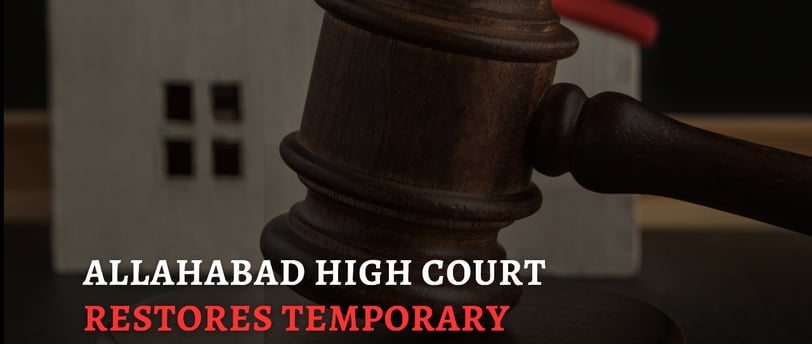Allahabad High Court Restores Temporary Injunction in Family Property Dispute, Cites Balance of Convenience and Risk of Irreparable Loss
In a significant judgment, the Allahabad High Court, through Justice Neeraj Tiwari, allowed a first appeal from order filed by Km. Sunita, overturning the Civil Judge (Senior Division), Jalaun's decision to reject her plea for a temporary injunction in a family partition suit. The Court underscored that denial of interim protection in partition cases could lead to multiplicity of litigation, irreversible damage, and undermine the administration of justice.
7/1/20253 min read


Background of the Dispute
The appeal arose from Original Suit No. 356 of 2023 filed by Km. Sunita against Smt. Manju and others, seeking partition of ancestral property. Alongside the suit, she had also filed an application under Order 39 Rules 1 & 2 of the Code of Civil Procedure for temporary injunction (Application No. 6C-2), which was rejected by the trial court on September 16, 2024. The present appeal sought to set aside both the trial court’s judgment and decree dated September 19, 2024.
Trial Court’s Reasoning
The trial court had declined the injunction primarily on two grounds:
Suppression of Material Facts: The plaintiff had allegedly concealed the fact that she had executed agreements to sell portions of the disputed property, both prior to and during the pendency of the suit.
Non-Impleadment of Subsequent Purchasers: The court held that failure to implead those who had purchased portions of the property during the litigation was a fatal defect.
Arguments on Behalf of the Appellant
Senior Advocate M.C. Chaturvedi, appearing for the appellant, challenged the trial court’s findings. He contended that:
The agreements to sell were executed without actual delivery of possession, and no sale deed had yet been registered, leaving the co-parcenary rights unaffected.
The non-disclosure of these agreements did not alter the fundamental nature of the partition suit.
The subsequent purchasers were not necessary parties under Order 1 Rule 10 CPC and could apply for impleadment if they so chose.
Being dominus litus, the plaintiff could not be compelled to add parties against whom no relief was sought.
The partition suit strictly involved family members, and adding third parties would fundamentally change its character.
Citing Vineeta Sharma v. Rakesh Sharma (AIR 2020 SC 3717) and Kasturi v. Iyyamperumal, counsel argued that the plaintiff’s rights as a co-parcener were clear and that the principle of dominus litus must be upheld.
Respondents’ Opposition
The respondents, represented by Senior Advocate Anoop Trivedi, countered that:
The concealment of sale agreements—especially one executed during the suit through a power of attorney—was sufficient to disentitle the plaintiff from equitable relief.
The subsequent purchasers, having acquired interests in the property, were necessary parties, especially in view of Section 52 of the Transfer of Property Act which governs transfers during the pendency of litigation (lis pendens).
The plaintiff lacked a prima facie case, and her conduct disqualified her from any equitable remedy.
They relied on precedents including Amar Singh v. Union of India (2011) 7 SCC 69 and Ambalal Sarabhai Enterprises v. KS Infraspace LLP (2020) 5 SCC 410, which stress the principle that a litigant must approach the court with clean hands.
High Court’s Findings
Justice Neeraj Tiwari, after reviewing the pleadings, evidence, and relevant case law, observed:
No Intent to Mislead: The omission to disclose the agreements to sell, though regrettable, did not fundamentally alter the nature of the partition suit, nor did it demonstrate a clear intent to mislead the court.
Applicability of Clean Hands Doctrine: The Court distinguished the case from those cited by the respondents, noting that the doctrine of “unclean hands” applies where litigants attempt to fraudulently obtain interim relief. In this case, there was no such egregious conduct.
The Court emphasized the equitable nature of interim relief, and cited multiple rulings including Gujarat Bottling Co. Ltd. v. Coca Cola Co. (1995) 5 SCC 545 and Zenith Metaplast Pvt. Ltd. v. State of Maharashtra (2009) 10 SCC 388, reiterating that courts must consider:
Prima facie case,
Balance of convenience, andrreparable harm or injury.
On Subsequent Purchasers
In a crucial observation, the Court held that purchasers of property during the pendency of the suit (pendente lite transferees) are not necessary parties by default. Referring to the Supreme Court’s judgment in H. Anjanappa v. A. Prabhakar, it clarified that:
A transferee pendente lite must seek impleadment at their own risk.
Their absence does not vitiate the suit, especially when the litigation concerns internal family matters.
Furthermore, the court reaffirmed the plaintiff’s dominus litus rights, holding that unless a relief is claimed against a party, they need not be impleaded.
Risk of Multiplicity and Irreparable Harm
Highlighting that both the plaintiff and defendants had executed multiple sale agreements (two and eight respectively), the Court expressed concern that:
Continued transfers would frustrate the partition decree.
Alterations to the property, including new constructions, could render execution of a future decree virtually impossible.
Despite the protection under Section 52 of the Transfer of Property Act, practical difficulties in enforcement necessitated immediate judicial intervention.
The Court observed:
“...in case interim injunction is not granted, the whole purpose of filing the partition suit would be defeated and even in case of final decree, it would be next to difficult to get the decree executed.”
Final Order
In conclusion, the High Court:
Allowed the appeal;
Set aside the judgment and decree dated September 16 and 19, 2024;
Directed both parties to maintain status quo;
Restrained further sale or alienation of the property;
Directed parties not to create any third-party rights until the final disposal of the suit.
The judgment provides a roadmap for courts dealing with partition suits where property alienation threatens the integrity of litigation. By reinforcing equitable principles and procedural propriety, it strikes a balance between individual litigants’ rights and systemic justice.
